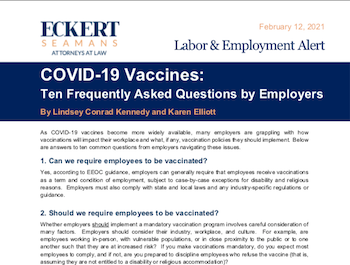Should My Small Business Mandate COVID Vaccinations?

There is a tricky situation unfolding daily for small business owners across Virginia as we speak, and it starts with the question: “Can I require my employees to get a COVID-19 vaccination?”
But, there is more to that question, including:
- Should I have it administered onsite?
- What ERISA or COBRA concerns do I need to know?
- What if someone refuses to get the shot for religious or other reasons?
- Can I fire someone for refusing to get a vaccination?
First things first, is it legal in Virginia to require the vaccine?
“Yes, you can require your employees to get the vaccine,“ says Karen Elliott, Esq. of Eckert Seamans. “It’s not against the law to require them. The real question is, should you? And, what are the legal parameters around it?”
So, where do you begin? And how do you avoid the alphabet soup found within the federal health and labor regulations?
 COVID VACCINE AND ALPHABET SOUP
COVID VACCINE AND ALPHABET SOUP
When you are thinking about whether to mandate the vaccine or not for your employees, the question becomes quickly complicated. And new legislation and agency guidance could be drafted and amended as we speak. It is a situation that continues to unfold, Elliott reports.
The decision to mandate or not could be a simple answer for some CEOs (like those who run a manufacturing facility where workers work together closely on the line and there is a need to keep the business running.) But beware, there could be ERISA (Employee Retirement Income Security Act), COBRA (Consolidated Omnibus Budget Reconciliation Act,) or HIPPA (Health Insurance Portability and Accountability Act) implications depending on how you structure your Shots-to-Arm campaign.
“If you arrange for the two-shot vaccine through a provider either offsite or onsite, now you’ve potentially got a health program that is subject to administration, and that potentially shifts it over to an ERISA Plan subject to COBRA requirements.”
It sounds helpful to establish an on-site or off-site shot program, but if you do, that is when complex issues might arise. For example if your program administers the “two-shot vaccine,” your program may now fall under ERISA. Elliott explains, “If you arrange for the two-shot vaccine through a provider either offsite or onsite, now you’ve potentially got a health program that is subject to administration, and that potentially shifts it over to an ERISA Plan subject to COBRA requirements.”
For example, should you fire someone or they terminate between the first and the second shot you may be required under COBRA to pay for a second shot. This is another reason Elliott encourages you to think through your decision.
“The only way to steer clear of the HIPAA, COBRA and ERISA issues is if you decide to require everybody to have a shot, you tell them to go someplace else and get the shot. You can require them to give you proof that they got the shot. And, you can give them time off to get the shot,” says Elliott. “However, if the employee meets the religious or ADA exemption, then you cannot fire them for not getting the shot,” she added.
FINAL WORD: ENCOURAGE AND WAIT AND SEE
Her advice today? Remember, you can require the vaccine (absent qualifying disability and religious reasons) and proof of vaccination.
If your business cannot survive without a mandate, then mandate with caution. Weigh all the alphabet soup concerns, especially if you decide to set up some kind of mandated program onsite or offsite.
For other business owners Elliott suggests you work with your HR department to develop a communication plan that encourages your employees to get the vaccine through their primary care doctor or the proper VHD network.
Elliott adds, “We don’t advise incentives other than days off.”
Ready to learn more? Download “COVID-19 Vaccines: Ten Frequently Asked Questions by Employers By Lindsey Conrad Kennedy and Karen Elliott”.
EDITOR’S NOTE: This article and Legal Update is intended to keep readers current on developments in the law. It is not intended as legal advice.

 COVID VACCINE AND ALPHABET SOUP
COVID VACCINE AND ALPHABET SOUP
Leave a Reply